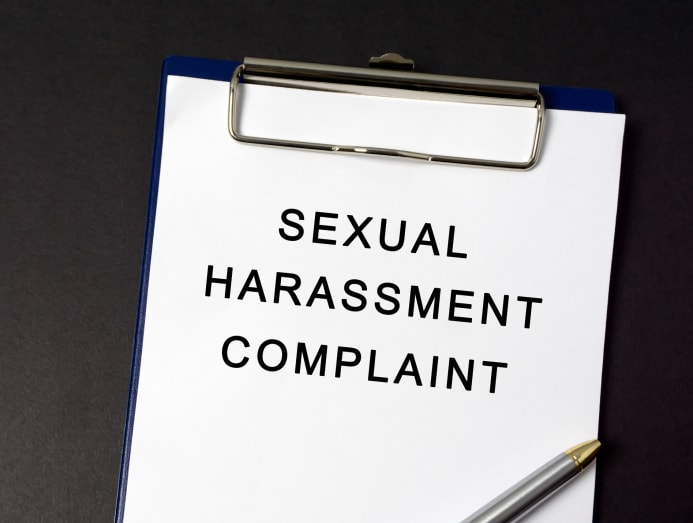Sexual harassment at work: How to spot red flags and where you can seek help
When does friendliness or flirtation cross the line into unwelcome and inappropriate behaviour at the workplace? What should you do if you are concerned about backlash from speaking out? CNA Women finds out.

Women often doubt their "gut" feelings when they experience sexual harassment at work and tend to brush aside their feelings of unease. (Photo: iStock/baona)
When it comes to sexual harassment in the workplace, incidents that appear to be harmless can amount to something more sinister.
If your male colleague frequently calls you "beautiful" or "sexy", is he just being friendly?
If your boss is all touchy-feely with you – and only you – is that inappropriate?
If a senior colleague repeatedly asks you out but you're not interested, can you say no without creating a bad impression?
For women at the receiving end of such behaviour, the biggest question they might be asking themselves is: Am I thinking too much – or is there more than meets the eye?
Victims are more hesitant to report the incident for fear of repercussions on their career, performance evaluation and day-to-day environment.
According to a joint survey released in January this year by AWARE and market research company Ipsos, two in five workers in Singapore reported encountering workplace sexual harassment in the past five years.
These ranged from incidents such as unwelcome touches to receiving remarks about their appearance.
The results from the 1,000 respondents also revealed that the harassment came from either a peer or a senior person in the office.
The Tripartite Alliance for Fair and Progressive Employment Practices (TAFEP) handled around 80 cases of workplace harassment from January 2019 until December 2020.

According to a TAFEP spokesperson, about one in five cases were related to sexual harassment, while others were related to verbal abuse, bullying and physical abuse at work.
And four out of 10 of the sexual harassment complaints involved the victim’s supervisor or someone higher up in the hierarchy.
IT DOESN’T ONLY TAKE PLACE IN THE OFFICE
Workplace sexual harassment can happen outside the organisation, too, from say, a client who could be either a peer or a person in authority.
This is what happened to Amy (not her real name), who was assigned to a joint project between her company and another last year. Her role saw her reporting to the other company’s supervisor; she also had to attend face-to-face discussions.
Those meetings started off innocently enough but took a worrying turn when the supervisor tried to touch, hug and even kiss her, said Amy’s lawyer, who requested anonymity. Amy also alleged that one time, the man tried to hug her from behind while there were others in the room.
This went on for several weeks.
Amy considered lodging a police report and reached out to the lawyer for advice. She also told her husband and made a report to her company’s Human Resources (HR) department.
After a warning letter was issued by Amy’s company, the accused told her “not to be so sensitive”, Amy’s lawyer recounted to CNA Women.
“She said that he was the kind of person who had a sense of entitlement and assumed that people whom he was physically close to shouldn’t take it as an act of harassment, but as a form of friendliness,” said the lawyer.

Amy was so traumatised by the experience that she asked for a transfer to another department, cutting off her contact with the other company.
Workplace sexual harassment can also still happen even in a work-from-home (WFH) arrangement – via a different setting such as Zoom, WhatsApp or Telegram.
According to market research firm Milieu Insight, incidents of workplace sexual harassment that can move online include:
- Uncomfortable questions about one’s personal life and appearance
- Unsolicited and persistent, one-sided flirting
- Lewd remarks
- Sending unsolicited pictures and messages of a sexual nature
“WFH arrangements may be a temporary shelter away from unsavoury workplace behaviours, but the heightened digital connection during this time means that employees can still very well be susceptible to sexual harassment,” said Stephen Tracy, Chief Operating Officer of Milieu Insight.
THE DECISION NOT TO REPORT WORKPLACE SEXUAL HARASSMENT
While Amy chose to speak out against her harasser, there are women (and men, too), who choose to keep quiet about the abuse.
They do so for various reasons and there are complicated emotions in play. Most common is the fear that people may not believe them.
Then, there’s the worry that they may have to leave their job if the story comes to light. And what about the gossip that ensues, both in the company and in the industry?

It’s not uncommon for women to deny their feelings of unease – it feels somewhat easier to convince themselves that they are merely over-imagining things, or that if they're able to stop thinking about it, the discomfort will go away.
In the AWARE-Ipsos survey, only three out of 10 respondents said they reported the incidents, citing a “desire to forget” about them, believing that it was “not severe enough” or that there was a “lack of evidence”.
“More often than not, individuals talk themselves out of believing that they were being harassed,” said John Shepherd Lim, Chief Wellbeing Officer at Singapore Counselling Centre (SCC).
WHAT CONSTITUTES WORKPLACE SEXUAL HARASSMENT
In a survey that Milieu Insight did in July, 90 per cent of Singapore respondents picked “inappropriate physical contact”, followed by “flashing” (87 per cent) and “requests for intimate favours in exchange for career advancement” (85 per cent) when asked what they considered sexual harassment.

UN Women defines sexual harassment as “any unwelcome sexual advance, request for sexual favour, verbal or physical conduct or gesture of a sexual nature or any other behaviour of a sexual nature that might reasonably be expected or be perceived to cause offence or humiliation to another”.
When such conduct interferes with work, it creates an intimidating, hostile or offensive work environment.
SCC’s Lim said the red flags of sexual harassment, which people tend to overlook or talk themselves down from, include:
- Constant intrusion of personal space. Although no actual physical contact might have been made, an individual might intentionally sit uncomfortably close to you.
- “Accidental” brushes that cause you to feel uncomfortable.
- Demeaning jokes made about women in general or specific women in the office, with the harasser laughing it off and adding a disclaimer that no harm was intended.
Workplace sexual harassment can be “extremely difficult for victim-survivors to speak out about”, said Margaret Thomas, president of AWARE. “The unfortunate reality is that many victims who speak out face retaliation and reputational damage, which can have negative consequences on their careers.”
WHEN POWER POLITICS ARE AT PLAY
Power politics refers to an imbalance of power between the perpetrator and victim, said Lim of SCC.
“Oftentimes, we find that situations in which the perpetrator is in a position of authority are more tricky, as victims are more hesitant to report the incident for fear of repercussions on their career, performance evaluation and day-to-day environment.”
And power politics can be tough to manage, said Lim, as it is not uncommon for bullying and harassment to come from individuals in authority.
“Victims often feel helpless as their superiors have substantial influence over their work environments and workload,” explained Lim, adding that it can be even more troubling if the superior has a good reputation among other employees.
“This causes victims to face the likelihood that they will not be believed or taken seriously,” he said.
Gossip and rumours add to the victim’s distress too, said Lim.
Emi Nietfeld, a former Google employee, wrote about her experience with workplace sexual harassment in The New York Times in April. The man was her boss and “in charge of her day-to-day work”.
During her time at the tech company, Nietfeld said she became concerned about her team lead’s behaviour when he addressed her as “beautiful” and “gorgeous” – even after she asked him to stop.
She also alleged that he took advantage of their one-on-one meetings to ask her to set him up with “a tall blonde”, preferably “someone who looked like her”.
“When I talked to outsiders about the harassment, they couldn’t understand: I had one of the sexiest jobs in the world. How bad could it be?

“I asked myself this, too. I worried that I was taking things personally and that if anyone knew I was upset, they’d think I wasn’t tough enough to hack it in our intense environment,” she wrote in the article.
“Saying anything about his behaviour meant challenging the story we told ourselves about Google being so special,” she added.
More often than not, individuals talk themselves out of believing that they were being harassed.
Nietfeld didn’t tell her manager about the team lead’s behaviour for more than a year – and only spoke out when she suspected that he “would become an official manager”.
When she finally filed her complaint with HR, she said: “Google went from being a great workplace to being any other company: It would protect itself first.”
Nietfeld’s story is a case in point on the complications of speaking out, that even after making the difficult decision to seek help, it may end up backfiring on the victim.
MAKING THE DECISION TO SPEAK OUT
Your feelings are valid, whether or not you feel that your experience “isn’t big enough” to mention or feel it’s worth getting help for.
“It is important to note that when it comes to harassment, a strong indicator lies in how the individual makes you feel,” said SCC’s Lim.
If you are unsure about whether to speak out, Lim’s advice is to vocalise your discomfort and take action to ensure that the individual treats you respectfully – whether or not this falls within the legal boundaries of what harassment entails.
Most often, we feel disrespected and manipulated when our personal boundaries have been crossed, he said.
For example, you could let a colleague know that you feel uncomfortable with him sitting too close to you during meetings, whether done intentionally or not.
Be aware of gaslighting too, Lim advised, which often occurs during a confrontation with the harasser, who could attempt to convince the victims that his intentions were misunderstood or that the incident did not happen at all.
Note the way the other party responds to your feedback during difficult conversations like these, Lim said.
A red flag can look like individuals who “excessively defend their actions” with “no signs of remorse or intention” to respect the boundaries.
WHAT IF YOU WORK FOR A SMALL COMPANY?
AWARE’s Thomas told CNA Women that many small and medium-sized enterprises (SMEs), which make up a vast majority of companies in Singapore, have environments that are ripe for abuse of power, including sexual harassment.
“They lack the resources for – or do not perceive the necessity of – a dedicated human resource department,” she said.
“Their informal culture also creates an unequal playing field where the managers’ decisions, behaviours and treatment of employees is overly contingent on their interpersonal relationships,” Thomas added.
These companies, unlike larger corporations, also lack the wherewithal to get support, such as engaging external help to write policies and providing employees with training on appropriate workplace behaviours, Thomas explained.

“I rely on my past experience, and I don't have too much training or expertise on the topic,” said an owner-manager during an interview last year done by AWARE and an independent consultant, as part of a survey to understand the challenges of SMEs in preventing and managing workplace harassment.
They interviewed seven SMEs from different sectors, including e-commerce and home cleaning.
When someone relies “purely on intuition” to base the prevention and management of workplace harassment, it can “crack the door open for victim-blaming attitudes”, said Thomas.
When it comes to harassment, a strong indicator lies in how the individual makes you feel.
One of the reasons why victims don’t report or speak out about sexual harassment at work is the belief that nothing will be done – whether by their company or the authorities.
According to Lim, while there are no standardised processes across Singapore companies, there are general guidelines that most harassment complaint investigation procedures adhere to, such as responding to complaints seriously and promptly, while ensuring confidentiality throughout the process.

“It is true that when structures are not prioritised – and procedures are not made clear and implemented – decisions on whether or not to proceed with investigations are contingent on the personal discretion of specific individuals, which can be rather skewed,” said Lim.
When that happens, a company faces the risk of failing to support the victim – even after they have taken the difficult step of speaking out about their discomfort, he added.
At the same time, organisations are “starting to notice” the importance of training and awareness about the issue, and Lim has seen an increase in the number of companies requesting for talks and training on workplace harassment, for both employees and managers.
During these sessions, specific harassment and bullying behaviours are addressed, and common harassment scenarios are also discussed.
“While employees become aware of how they can protect themselves and respond to harassment from their colleagues, employers too have guidelines on how they can respond or set in place zero-tolerance policies to create a safer workplace environment for all,” said Lim.
WHERE YOU CAN TURN TO FOR HELP
Voicing out your concern to your direct supervisor (if he isn’t the perpetrator) is a good first step, said Lim, especially if it concerns members within the team.
“This gives (your supervisor) a heads-up and an opportunity to have a conversation with both you and the alleged perpetrator, before this escalates upwards,” he explained.
Supervisors would usually also appreciate knowing what’s going on in their team, in case they are asked about it, Lim added.
But if the harassment does not stop, you can then escalate it to HR, he advised.
However, if you feel uncomfortable about reporting the incident to your supervisor, manager or HR (or if such channels aren’t available in your company), you can get assistance and advice by calling TAFEP at 6838 0969 or filing a report at www.tal.sg/tafep/contact-us, said a TAFEP spokesperson.

According to TAFEP, they may also refer you to other organisations who may be better placed to provide legal advice and counselling.
AWARE’s Workplace Harassment and Discrimination Advisory (WHDA), which is aimed at women, provides a “bespoke” service to help sexual harassment victims figure out their options and what they can do next.
You can call their hotline at 6950 9191 or email them at whda [at] aware.org.sg, even if you aren’t sure if what you’ve experienced is in fact harassment or if you are still trying to make sense of it, said AWARE's Thomas.
For example, the WHDA may be useful for victims who work in organisations without a HR department or who don’t have the capability to take things forward.
Moreover, not every victim wants to lodge a police report as it can be a very arduous process that can take years, said Thomas. “The same goes for pursuing a lawsuit.”
The advisory also works with AWARE’s Sexual Assault Care Centre on cases involving sexual violence, in case the client requires more intensive emotional support, said Thomas.
Should the sexual harassment continue, you can call the Ministry of Manpower’s hotline at 6438 5122 for more advice on what to do, suggested SCC’s Lim.
You can also apply for a protection order under the Protection from Harassment Act (POHA), said Thomas. With a protection order, the alleged harasser must stop harassing or stalking you and/or remove any harassing publication, for example, delete an online post.
“However, POHA does not provide an employee protection from retaliation in the workplace nor does it impose any legal responsibilities on employers to prevent harassment or take action against workers who may have committed an offence,” added Thomas.
Editor’s Note: This story has been updated to reflect the clarifications from TAFEP about their role in referring people to other organisations for legal advice.
CNA Women is a section on CNA Lifestyle that seeks to inform, empower and inspire the modern woman. If you have women-related news, issues and ideas to share with us, email CNAWomen [at] mediacorp.com.sg.








